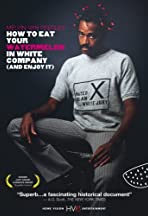From there I learned about a film, "How To Eat Your Watermelon in White Company (And Enjoy It)" (2005) with more details of Melvin's film history. The title came from a remark that Melvin liked eating watermelon, even though it was stereotypical which he thought was no reason to deny any enjoyment. Born in Chicago, after military service worked as a portrait painter in Mexico and then he spent time in the Netherlands studying astronomy. The he moved to France learning the language, got experience and moved on to writing novels.
In the course of his life he also became a Wall St. trader who wrote an investment book a singer/song writer and a Broadway director who had been nominated for a Tony award.
His first feature film was "The Story of a 3 Day Pass" (1967) based on his novel. It is mostly in
French. A simple story of an American
soldier, Turner played by Harry Baird gets a 3 day pass. The protagonist meets a friendly French woman, Miriam who speaks
fair English. At one point he hears subtle racist words meant to diminish him and starts a fight.
Flashes of Africans shown to demonstrate stereotypical views and fantasies of some
Europeans. Some familiar American soldiers encounter the couple at beach (Normandy) and told their captain. The captain who had said kind words to justify the 3 day pass, feels betrayed and takes away a promised promotion and confines to barracks. By a fluke a group of Negro women singing spirituals shows up by bus. Turner as "one of their own" is asked
to give them a tour. He was a big hit with the group and the leader wants to "fix it"
(his detention in barracks). He got relief, but when he tried to phone
Miriam was told she was off sick. The film ends with him flopping in his bed
disappointed and thinking it was an excuse. Harry Baird was born in British Guiana and did a lot of films in Britain and then traveled to Italy and France for more film work.
Melvin's best known film was "Sweet Sweetback's Baadasssss Song." He produced, wrote, directed and acted in it. At first to the censor board X rated it and he protested with a tag line and a T shirt, "Rated X by an all white jury." It went on to successful distribution and is said to have ushered in films that were considered 'blaxkploitation." Originally Melvin identified that there was a market for movies reflecting black culture and music. Not everyone considered it a healthy trend, but black culture was now available for the general public and generating profits.
This project got started because it seemed strange that a black American would speak French and then get his start in French film. In fact it was common for American artists to get a start in France. The world benefits by its global connections.


No comments:
Post a Comment